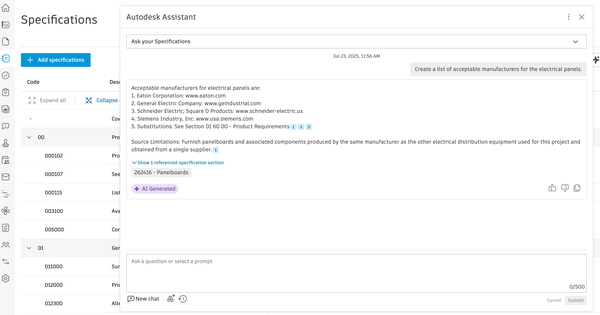
With Autodesk AI, your expertise meets intelligent automation—powering faster work, smarter decisions, and stronger project outcomes.
AI automates repetitive tasks to reduce errors and free up time for high-value work.
AI analyzes project data to uncover insights, reveal patterns, and guide next steps—so you can act with confidence.
AI catches issues early and helps get the job done right the first time, saving you time and money.
AI can help detect hazards, helping prevent accidents and keeping crews safer on the jobsite.

Boost productivity with the Autodesk Assistant in ACC. Get Autodesk AI-powered assistance directly where your teams work to access, validate, and summarize data. Use example prompts, write your own, save them to your Prompt Library, and view a full chat history.
Spot and prioritize risks before it becomes costly problems with Autodesk AI-powered Construction IQ. Construction IQ scans issues, checklists, observations, and more—delivering smart insights where they matter most. Trusted over 5 million times in the last year, it's a proven tool for proactive risk management.
Simplify file management with the power of Autodesk-AI. Instantly extract and manage data from drawings, automatically section specifications, and identify high-risk design issues with Construction IQ.
Accelerate workflows with Autodesk-AI. Auto-generate submittal logs with suggested missing submittals, flag high-risk quality and safety issues with Construction IQ, and tag photos with metadata for reviews, progress tracking, and more.
Streamline preconstruction by reducing tedious tasks with Autodesk AI—automating bid forwarding, financial data entry, and symbol detection to simplify bidding, qualification, and takeoff workflows.
"Autodesk Assistant helps quickly locate items within the specifications, saving my team time and increasing productivity. Instead of searching for issues, we can focus on solving them."
Jason FuhrmannExecutive Vice President, Project DevelopmentMiron Construction Co., Inc
Ask a question and get fast, referenceable answers from the Autodesk Assistant.
Analyze project data to identify and prioritize design, quality, safety, and project control risks.
Automatically identify potentially missing submittal items before construction starts.
No more missed bids. Avoid manual bid consolidation by forwarding bid from any source, automatically populating your bid board.
Artificial intelligence (AI) is an increasingly transformative force in the construction industry, that's altering how projects are planned, managed, and executed. AI-powered technology poses a major opportunity for AECO firms to dramatically improve productivity, reduce operating costs, and enhance safety in construction projects. According to the 2025 Autodesk Design & Make Report, over 76% of leaders say they are increasing their investment in AI, up 9% from the previous year. As the construction sector becomes more digitally advanced and works to proactively solve issues like the labor shortage and rising costs, AI has a crucial role in this transformation. AI can impact nearly every aspect of the design, preconstruction, and building process.

Autodesk is committed to responsible, ethical, and secure AI development, deployment, and use. We adhere to strict governance processes to protect our customers’ personal data and intellectual property. Visit the Autodesk Trust Center to learn more about our approach to creating trusted AI.
Take a deep dive into Autodesk AI for construction.

Industry experts share their insights on how they imagine AI will shape construction in 2025 and beyond.

Explore how Autodesk AI powers innovation across AECO, Design & Manufacturing, and Media & Entertainment.

The world’s leading publisher of peer-reviewed research on generative AI models trained for CAD geometry, driven by a global team advancing AI innovation.